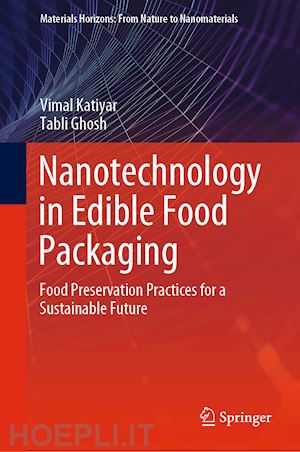
Questo prodotto usufruisce delle SPEDIZIONI GRATIS
selezionando l'opzione Corriere Veloce in fase di ordine.
Pagabile anche con Carta della cultura giovani e del merito, 18App Bonus Cultura e Carta del Docente
< p="">
This volume delivers a systematic overview of nanotechnology in the development of edible food packaging with noteworthy characteristics for improved food quality. It covers current research trends, history outlines, and state of the global marketin combination with associated biomaterials and synthesis strategies. The contents detail the use of various emerging bionanostructured materials such as cellulose nanostructures, chitosan nanostructures, and more.It further deliberates an in-depth discussion on various synthesis strategies and routes for the development of edible food packaging in terms of utilizing various nanosystems such as polymeric nanocomposites, nanoencapsulation systems, nanoemulsion systems, and others.Further, it also discusses experimental practices for bionanostructured and edible packaging materials to check the effectivity in terms of offering enhanced shelf life of food products.
It also touches upon the socio-techno challenges in-line with developing edible packaging materials using nanotechnology for high performance packaging application. The book is an excellent guide for both the academia and industry especially early career professionals in edible food packaging sectors for selecting proper biomaterial involvingbiofillers, modifiers, cross linkers, compatibilizers and others to enhance the property of edible food packaging for targeted features.
Dr. Vimal Katiyar is currently a Professor in the Department of Chemical Engineering at Indian Institute of Technology Guwahati (IIT), India. He is also an Honorary Senior Fellow to Kyoto Institute of Technology, Japan, Visiting Professor at GIFU University, Japan and has also been honored as Chair Professor at Numaligarh Refinery Limited & Hindustan Gums Co. Limited. He received his Ph.D. in Chemical Engineering from IIT Bombay, India. Currently, he is the coordinator for three Centre of Excellence at IIT Guwahati including Centre of Excellence for Sustainable Polymers funded by Department of Chemicals and petrochemicals, Government of India and the Joint Centre of Excellence for Biofuels and Biocommodities funded by Department of Biotechnology, Government of India and NRL-Centre of Excellence for Sustainable Materials at IIT Guwahati through industry intervention.His main area of research includes sustainable polymer development, its processing, and their structure property relationship, rheological aspects, migration studies, toxicological effects, polymer degradation, polymer based nanomaterials, food packaging, clean and green energy technologies. He is a co-inventor of 22 granted/filed patents. He has published more than 100 peer reviewed research articles in highly reputed journals and more than 250 conference papers and 40 book chapters.
Ms. Tabli Ghosh is currently a DST INSPIRE Fellow under the supervision of Prof. Vimal Katiyar in the Department of Chemical Engineering at Indian Institute of Technology Guwahati (IIT), India. Her work focuses on developing and evaluating the health impacts of edible medicinal coatings based on bioactive compounds facilitated bionanostructuresfor the enhanced shelf life of food products. She pursued her B.Tech. and M.Tech. from the Department of Food Engineering and Technology, Tezpur University, India. She was awarded the DST Inspire Fellowship for pursuing her Ph.D. Shewas a special research student at the United Graduate School of Agricultural Science, Gifu University, Japan. She has authored 18 book chapters, and 6 research articles in journals of national and international repute.










Il sito utilizza cookie ed altri strumenti di tracciamento che raccolgono informazioni dal dispositivo dell’utente. Oltre ai cookie tecnici ed analitici aggregati, strettamente necessari per il funzionamento di questo sito web, previo consenso dell’utente possono essere installati cookie di profilazione e marketing e cookie dei social media. Cliccando su “Accetto tutti i cookie” saranno attivate tutte le categorie di cookie. Per accettare solo deterninate categorie di cookie, cliccare invece su “Impostazioni cookie”. Chiudendo il banner o continuando a navigare saranno installati solo cookie tecnici. Per maggiori dettagli, consultare la Cookie Policy.